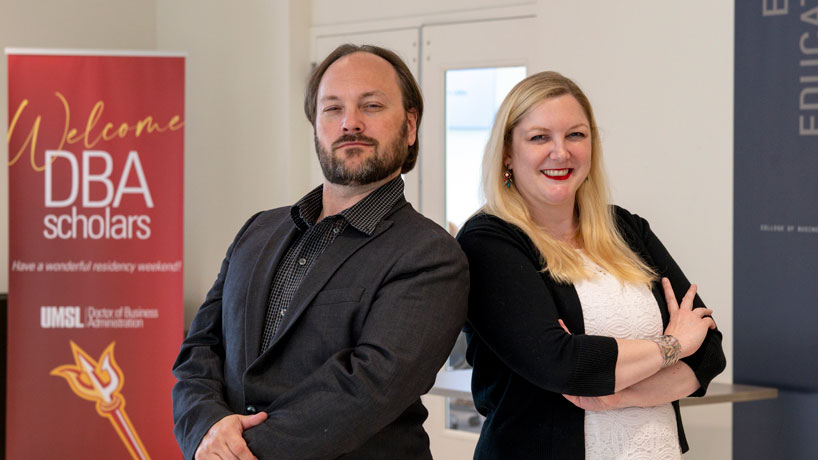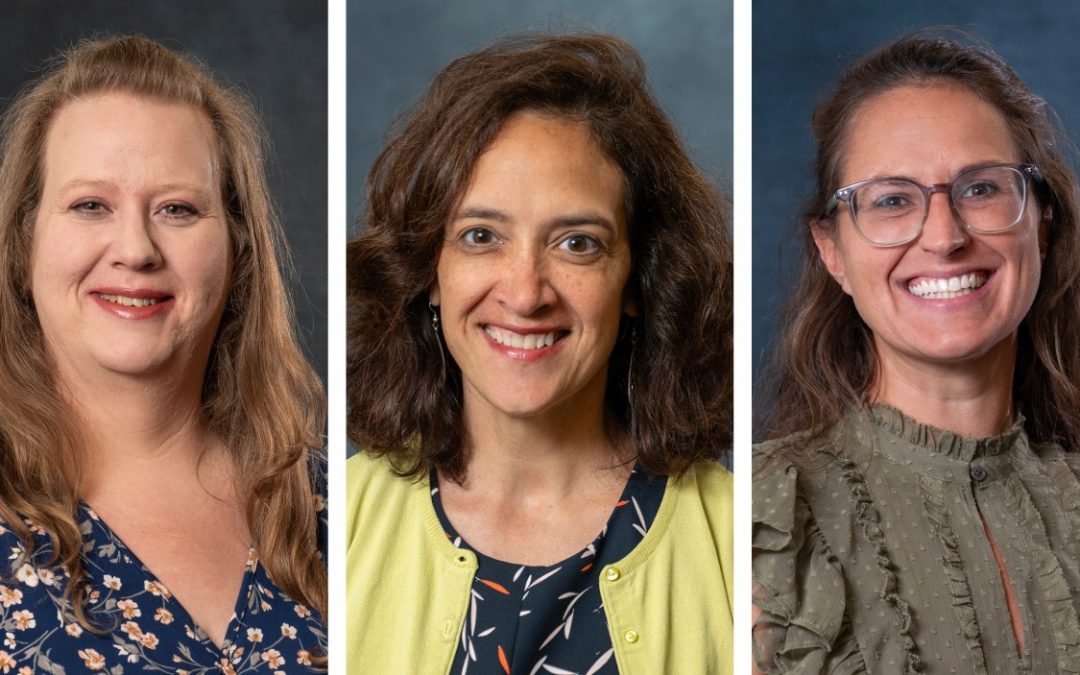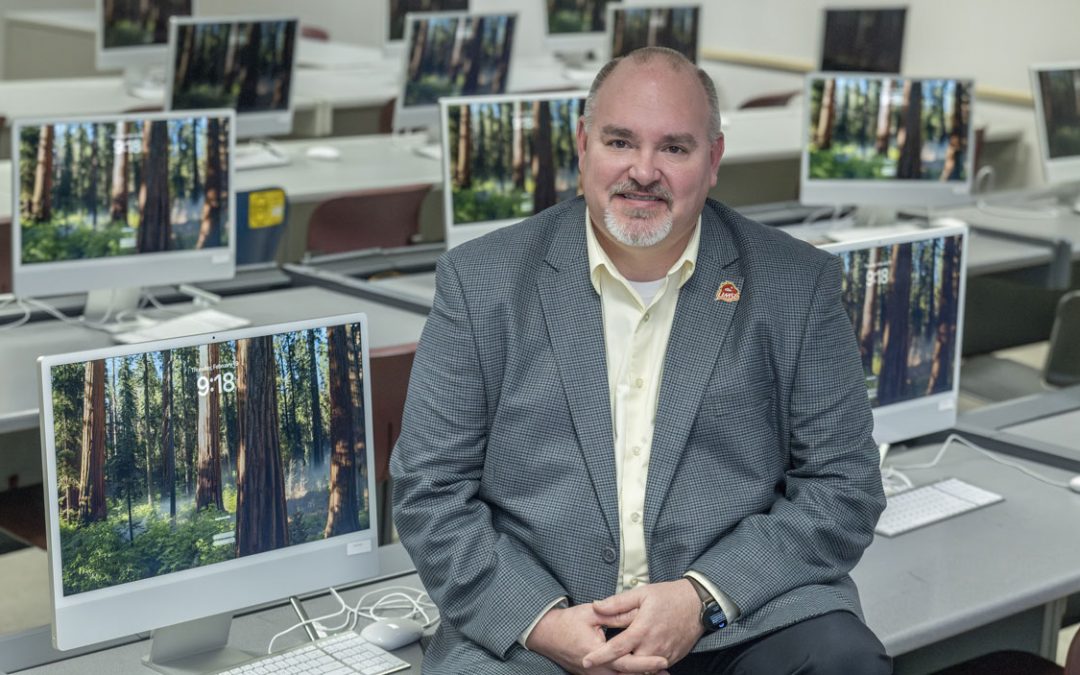
DBA students Matthew Aplin-Houtz and Sarah Willey won a $5,000 grant from the Association of Fundraising Professionals to support their research on “The Ethics of Care.” (Photo by August Jennewein)
Sarah Willey is a nonprofit consultant whose work focuses on fundraising and communications.
She has a master’s degree in nonprofit management and is a certified social media strategist who helps nonprofits develop and refine a digital identity. As part of her consulting practice, she also provides fundraising and grant writing services.
Through her work, Willey has observed areas that would benefit from practicing the Ethics of Care, defined as a “normative ethical theory that holds that moral action centers on interpersonal relationships and care or benevolence as a virtue.”
Willey has been pursuing a Doctorate of Business Administration from the University of Missouri–St. Louis College of Business Administration, and she met Matthew Aplin-Houtz through her involvement with the DBA Program. He owns a health clinic in Indiana, and the two have connected over class projects and have found that they have similar interests and compatible work methods.
When Willey’s professional organization, the Association of Fundraising Professionals, put out a request for proposals for research projects, she was interested in exploring EoC and thought Aplin-Houtz would be a perfect research partner. They drew up a proposal that expounds on the theory of EoC in the context of fundraising, and they wound up winning a $5,000 grant to pursue research on the topic via a series of three studies.
Willey was working on a paper with a colleague outside of UMSL that sparked conversation about the nonprofit industry and ethics.
“I brought it up to Matthew because we’ve collaborated a lot, both on class projects and on research we’ve done outside of class,” Willey said. “And we really had an interest in further developing a series of studies that consider building a more professionalized theory of ethics for the field of nonprofit fundraising.”
With Aplin-Houtz being in health services, the idea of EoC was applicable to his experience with clients and how to produce the most effective care. He’s also seen a need for that type of consideration in the nonprofit sector, as those assisted may not be receiving the help they need to move forward effectively.
“I love the concept of ethics of care because part of the thing that happens is, in general, the beneficiary is not completely looked at or considered as anything other than a tool in order to get resources by some nonprofits,” Aplin-Houtz said. “I would like for there to be more of a connection between what’s actually impactful because sometimes the assistance hurts because we’re imposing our view on someone.
“An example would be offering a person who has a handicap to push their wheelchair. Well, it’s wonderful to offer that, but if you keep pushing and pushing you also are possibly taking something away. For them, the value is to be able to get up and walk themselves, and you’re taking away the independence they’re working toward.”
Willey and Aplin-Houtz’s research involves a series of interviews conducted with diverse nonprofit professionals in the United States with at least three years of experience who work in the areas of development and are also formally credentialed. They want to know how moral and ethical dilemmas are addressed.
“Our goal is to produce research that in addition to being academically rigorous is also relevant to the real world in the areas of practice we come from,” Willey said.
Willey and Aplin-Houtz believe their research can help align nonprofits as well as other businesses with their original intent to be of service and include the perspective of the community they assist as they make decisions.
This all falls under what Willey and Aplin-Houtz call “crafting a culture of caring” that, in the space of nonprofit fundraising, would shift the focus from the donor to include beneficiaries of services.
Along with a master’s degree in composition, a master’s degree in voice and an MBA, Aplin-Houtz also has a certification in medical compliance. His idea of being compliant goes beyond “checking the boxes” but rather includes a holistic approach that centers on those receiving service, which is what attracted him to this research with Willey.
“More than anything,” Aplin-Houtz said, “I want to understand why people choose certain ethical frameworks because ethics comes down to the concept right or wrong. Those matter. Those elements matter to people. So from that I want to understand, outside of just the traditional right or wrong perspectives, maybe there’s a shade of gray that’s associated with this. And to be able to apply something not only just in fundraising, but to take it to nursing. Since I’m coming from a medical issue area, I would love to actually marry those fields and have them connect.”
This outcome of their research could make Willey and Aplin-Houtz thought leaders in their respective industries. The UMSL DBA they’re pursuing will lend further credence to their expertise.
“Working for nonprofits and now working as a consultant with nonprofits, I wanted a degree in business that would allow me to further study nonprofit organizations,” Willey said, “and learn how I could leverage having this degree and doing my research to help encourage more nonprofits to bring the right business smarts into their practices.”














